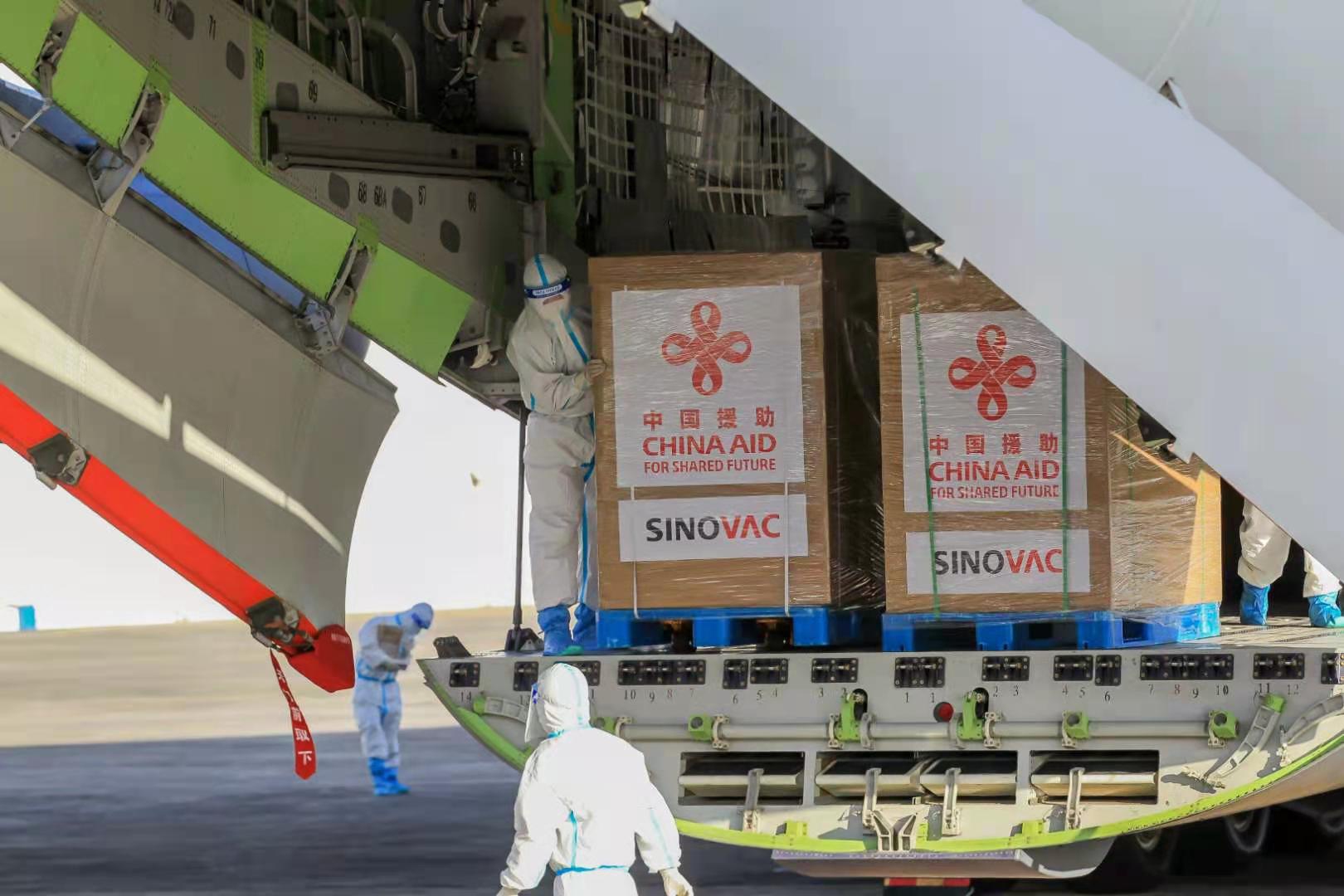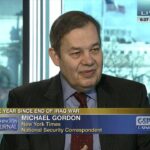US President Joe Biden pledges to allocate 80 million doses of COVID-19 vaccines with other countries on May 17 in a bid to counter Russia and China.
“Just as in World War II, America was the arsenal of democracy in the battle against [the] COVID-19 pandemic. Our nation is going to be the arsenal of vaccines for the rest of the world,” Biden said, adding “just as democracies led the world in the darkness of World War II, democracies will lead the world out of this pandemic.”
Biden also took the opportunity to mention China and Russia in his speech and stressed “the US was committing to sharing five times more than any other country had donated in COVID-19 vaccines.”
Several media outlets commented that Biden’s speech showed he viewed vaccines as a strategic diplomacy tool. In the eyes of some Western media and politicians, China has an “ulterior motive” in helping other countries, while the US is justified to do so. Their double standards are exposed in their attitudes toward vaccine distribution.
Ben Sasse, a US senator from Nebraska, wrote on the Wall Street Journal on May 17 that “The US should set a goal of vaccinating more than one billion people around the world by Thanksgiving — and without dumping intellectual property, a foolish act with perverse consequences.”
He wrote that “when the US fights famine, we send bags of rice with the American flag. When the US fights COVID-19, every band-aid and bag of cotton balls need to be stamped with Old Glory.”
Thomas Shannon, a former undersecretary of state for political affairs, told Bloomberg that the US needs to find a way to get credit for this given the Chinese and Russians are presently busy doing the same.
According to a Bloomberg report, Biden has taken three key steps to increase global supply. One of them was a partnership with the other Quad members to boost vaccine manufacturing in India through 2022.
Analysts pointed out that the US is more of a “driving force” behind India’s “vaccine diplomacy.” While India’s epidemic is deteriorating, the vaccine agreement reached under the Quad is reportedly still in place. Southeast Asian nations are among the most important recipients of the vaccines.
The New York Magazine said that the US is playing “catch-up” at vaccine diplomacy. “The shift in the [Biden] administration’s thinking came amid the crisis in India and the reality that other countries, including Russia and China, were eating America’s lunch in the vaccine-diplomacy game.”
“The potential rewards of vaccine diplomacy are considerable, but the risks of not engaging in it are even greater,” it said.
‘Cry for help’
In recent months, the US has been criticized by the international community for its hoarding of COVID-19 vaccines and restricting the export of raw materials. Some foreign media have noticed that even the country’s allies or important partners could hardly persuade the US to provide vaccines to them.
The Politico recently reported that since December Ukraine President Volodymyr Zelensky has been “pressing” Washington to help Ukraine gain vaccines, but did not receive any concrete promises.
Even India is involved in the US’ vaccine diplomacy plan. Indemnity for vaccine manufacturers was a major task for External Affairs Minister S. Jaishankar’s latest visit to the US, India media reported on May 29.
The international society is still impressed by Serum Institute of India CEO Adar Poonawalla’s “pleading” for the US to lift the embargo on the export of raw materials.
It was not until April 20 that the US announced its intention to help India in its time of need.
South Korea is yet another example of countries facing increasing difficulties in cooperating with the US in vaccines. South Korean President Moon Jae-in announced after meeting with Biden in Washington on May 21 that the US has promised to provide COVID-19 vaccines to South Korea, including those for the 550,000 South Korean troops working in close contact with American forces in the region.
Segye Ilbo of South Korea noted that the doses are actually for protecting US army service members garrisoned in South Korea, due to their proximity to Korean army officers during joint drills. Additionally, the US has the wartime operational control over the South Korean military.
Some South Korean media outlets and experts believe that by taking advantage of vaccines, the US is set to gain at least three benefits from the meeting between Moon and Biden. Firstly, the US can have South Korea profess the significance of Quad talks in some aspects. Secondly, the US can compel South Korea to mention the status quo of the Taiwan Straits and in the South China Sea for the first time in a joint declaration. Thirdly, main Korean syndicates including Samsung plan to invest $40 billion in US in industries such as the manufacturing of semiconductor and automotive batteries.
More than a month ago, South Korean Foreign Minister Chung Eui-yong said that the US and South Korea were discussing a “vaccine swap” arrangement. Chung said that “Seoul helped the US last year by providing test kits and face masks when it was struggling with the pandemic.”
On the same day, Biden noted that Washington had ruled out sending vaccines overseas “until it secures adequate supplies at home.” Korean media said this statement effectively killed Seoul’s “vaccine swap” idea.
Xin Qiang, deputy director of the Center for US Studies at Fudan University, told the Global Times that currently, the Biden administration’s intention to engage in “vaccine diplomacy” is obvious, such as exchanging interests with other countries, requiring others not to accept or accept a lower number of China’s vaccines, or by demanding more supports on political, diplomatic, and economic issues with the US.
Xin said that the US is either going against China or competing with China for so-called global leadership or greater global influence. “This is actually an inevitable line of logic within the framework of the Biden administration’s comprehensive strategic competition with China.”
He noted that the US’ “vaccine diplomacy” is also targeting Russia and some East and Central European countries. The latter do not have the capability to produce and develop vaccines and could only rely on other global powerhouses’ supplies. “The US’ next target is these countries, many of which are members of EU and NATO.

The first batch of Sinovac Coronavirus vaccine delivered by China arrives at the Villamor Air Base in Manila, capital of the Philippines, on the afternoon of February 28, local time. Photo: cnsphoto
No single dose yet to send
While Biden pledges to allocate 80 million doses before the end of June, the White House has yet to send out any of the promised doses abroad allegedly owing to a variety of hurdles from logistical to regulatory, NBC reported.
It listed challenges including transportation and getting Food and Drug Administration authorization for the AstraZeneca vaccine.
“Of the 80 million doses pledged so far, 60 million were to have come from AstraZeneca — but the administration says it won’t release those doses until the vaccine has been cleared by US regulators, even though it has been approved for use in other countries,” read the report.
It also mentioned difficulty in the “delicate diplomatic balance of trying to determine which countries should get doses and how many as numerous key allies grapple with shortages.”
Li Haidong, a professor at the Institute of International Relations of China Foreign Affairs University, told the Global Times that there is a question mark over whether the Biden administration’s pledge of 80 million doses of vaccine can be fulfilled.
He said that the pledge will face two challenges: US companies that produce vaccines don’t want to hurt their interests; a significant number of members of Congress remain highly concerned about the outbreak. He said if there is a resurgence in the US during vaccine distribution, Biden will be condemned and his efforts blocked.
“The current approach of the US’ vaccine diplomacy is very clear, that is, let other countries make a substantial contribution to the global fight against the pandemic, and the US will contribute good wishes to the global fight against the pandemic, but the US will not do anything of its own,” Li said.
He noted that the real concern of the US is not the pandemic in other countries, but whether it can bring some countries into a strategic competition with China, which is not good for effective international cooperation in fighting the pandemic. “The US political elite’s ideas on fighting the pandemic are very short-sighted and paranoid,” he said.
Photo: VCG



